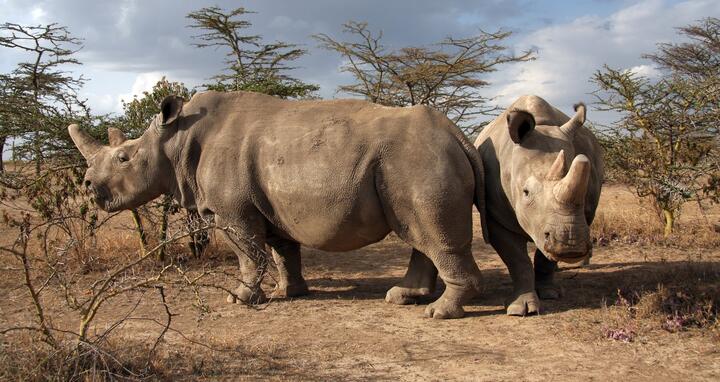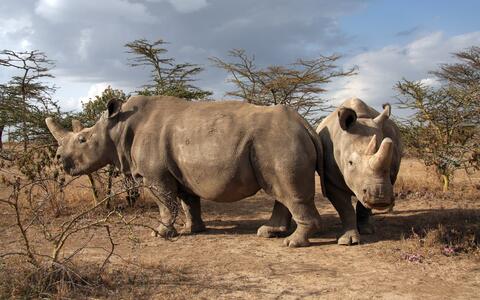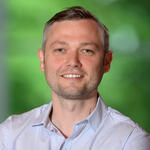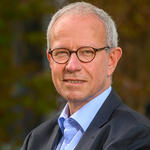Last chance for the Northern White Rhinoceros: German Federal Ministry of Education and Research supports high tech for conservation with the BioRescue project
With the successful transfer of an embryo into the uterus of a Southern white rhinoceros at the end of May 2019, the research team has already reached an important milestone. The ethical and social questions arising from BioRescue will be addressed by the scientists in an accompanying research project.
Upon the launch of the project, Dr. Michael Meister, Parliamentary State Secretary to the Federal Minister of Education and Research, said: “Biodiversity provides the basis for our livelihoods. The Federal Ministry of Education and Research has therefore established the Research Initiative for the Preservation of Biodiversity. Within this initiative, we primarily focus on promoting precautionary research aimed at preserving biodiversity. Parallel to this, we also facilitate immediate measures to protect endangered species, such as the ambitious BioRescue project. Thanks to the impressive combination of different research approaches and the great dedication shown by those involved, there is now both the possibility and the hope that we will be able to preserve critically endangered species such as the northern white rhinoceros.”
“The BioRescue research project can play an important role in the conservation of species diversity because it significantly advances existing approaches for species conservation,” says project leader Prof. Thomas Hildebrandt from the Leibniz-IZW. The international team of experts from Germany, Italy, the Czech Republic, Japan and the USA will jointly develop methods and techniques for reproduction and stem cell research. These are being used for the first time to save an endangered animal species.
“The BioRescue project is a perfect example for the excellent and relevant research of the Leibniz Association. An interdisciplinary and international research team transfers its findings and methods directly into application and thus helps to save a valuable key species such as the Northern White Rhino from extinction”, says Prof. Matthias Kleiner, President of the Leibniz Association.
The situation for the Northern White Rhino is particularly critical: after the death of the last bull, Sudan, in March 2018, only two females remain: Najin and Fatu. They live in the Ol Pejeta Conservancy in Kenya.
The team of experts is pursuing two approaches to save this important species
-
In a first step egg cells will be harvested from the two remaining Northern cows. In a second step an egg cell will be exposed to sperm for fertilization. The semen of deceased Northern White Rhinos is stored at minus 196 degrees Celsius in liquid nitrogen at the Leibniz-IZW. The embryo obtained by in-vitro fertilisation will be transferred into the uterus of a Southern White Rhinoceros via embryo transfer and carried out by the surrogate mother. Najin and Fatu are no longer able to carry offspring themselves.
This embryo transfer in rhinoceros is new territory for assisted reproduction and has never been performed before. Therefore, the new procedures are tested in advance with the transfer of Southern White Rhinoceros embryos. If everything works smoothly, embryos of the Northern White Rhinoceros will be used. As part of BioRescue, Prof. Thomas Hildebrandt and his team have already reached a milestone on 27 May 2019: For the first time, they succeeded in transferring an embryo into the uterus of a Southern White Rhinoceros. Owing to the size of the embryonic structure, however, the scientists assume that the embryo was not able to implant itself in the uterine lining despite its successful growth. The recipient animal will soon be examined again, as this is only a snapshot and final clarification is necessary. Further embryo transfers will be carried out in the near future so that the team is optimally prepared for utilising the technique for saving the Northern White Rhinoceros. -
For the second approach, the Leibniz-IZW team cooperates with renowned stem cell experts: Prof. Katsuhiko Hayashi (Kyushu University, Japan), Dr. Sebastian Diecke (Max Delbrück Center for Molecular Medicine in Berlin), Dr. Micha Drukker (Helmholtz Zentrum München), Prof. Cesare Galli (AVANTEA) and Prof. Vasil Galat (Reproductive Genetics Institute, USA). The aim is to convert skin cells into pluripotent stem cells and then mature them into primordial germ cells (PGC). In a trial study, Dr. Drukker's team has already been able to convert skin cells into pluripotent cells, which will be further improved in the future. In Dr. Diecke's laboratory, the cells were characterised in detail and matured into various other tissue types such as heart muscle cells. "These preliminary investigations are essential in order to be able to extract germ cells - sperm and oocytes - from pluripotent stem cells in further steps," Dr. Diecke says. The final result will be a self-sustaining, genetically healthy population of Northern White Rhinoceroses that can survive in the wild. Due to the small number of eggs and sperm available, the stem cell approach is important in order to increase the genetic variability of the population.
Najin and Fatu, the last of their kind, in the Ol Pejeta Conservancy in Kenya.
The BioRescue project attempts to push the boundaries of what is medically and technically feasible for the benefit of species conservation. This raises ethical questions regarding the use of the newly created possibilities. These questions will be openly discussed in the BioRescue project: Prof. Barbara De Mori heads the Ethics Laboratory for Veterinary Medicine, Conservation and Animal Welfare at the University of Padua (Italy) and is responsible for research on ethical questions in the fields of medicine, technology and society in the BioRescue project. In this context, the consortium will actively promote public debate in order to find answers to the ethical responsibility of scientists, governments and the public for the conservation of biodiversity.
As a strong African partner, the Kenyan government plays a central role in saving the Northern White Rhinoceros. The Republic of Kenya's exemplary biodiversity policy is a backbone for the sustainability of African biodiversity. The fact that the Kenyan government - as a network partner - attaches great importance to the BioRescue project is demonstrated by the participation of the Ambassador of Kenya, His Excellency Joseph Magutt, at today's press conference.
With its funding of BioRescue, the BMBF supports the German network partners. Research needs that are not covered by BMBF funding are met by the international consortium partners and generously provided by external donors and supporters from industry, such as the science and technology company Merck, and the private sector. “We are embracing our responsibility as leaders in fertility by providing innovative technologies to give this ambitious project the best chance at success,” says Dr. Jan Kirsten, Head of Global Business Franchise for Fertility, Merck.
Further Information
- Background information on the Northern White Rhinoceros
- Rhinoceroses from skin cell
- Statement Statement of Prof. Willnow (MDC)
Contact
Jutta Kramm
Head of Communications Department
Max Delbrück Center for Molecular Medicine in the Helmholtz Association (MDC)
Robert-Rössle-Straße 10
13125 Berlin
Phone: (0)30 94062140
jutta.kramm@mdc-berlin.de
Steven Seet
BioRescue project management and head of Science Communication
Leibniz Institute for Zoo and Wildlife Research (Leibniz-IZW) in the Forschungsverbund Berlin e.V.
Alfred-Kowalke-Straße 17
10315 Berlin
Phone: (0)30 5168125
seet@izw-berlin.de








